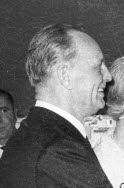Heinrich Gerlach (Admiral)
Heinrich Gerlach (born August 31, 1906 in Wismar ; † June 27, 1988 ) was a German naval officer , most recently Vice Admiral of the German Navy and from 1963 to 1966 in command of the fleet .
Reichsmarine and Kriegsmarine
Gerlach joined the Reichsmarine on April 1, 1925 after attending grammar school . After being promoted to lieutenant at sea on April 1, 1929, he was transferred to the light cruiser Karlsruhe as a watch officer and then served as a company officer with the III. Naval artillery department in Swinoujscie . On October 1, 1932 he was promoted to first lieutenant at sea . After various uses on land and on torpedo boats , Gerlach was appointed captain lieutenant on July 1, 1935 in what is now the Navy and was employed as a cadet training officer on the ship of the line Silesia .
After training as an Admiral Staff Officer 1937-38, Gerlach became 2nd Admiral Staff Officer with the leader of the torpedo boats. From November 1, 1939, he held the same position on the staff of the destroyer leader . On April 10, 1940, he was seriously wounded in the Battle of Narvik . From November 1940 to July 1941 he commanded the destroyer Z 25 . He was then transferred to the Operations Department of the Naval War Command, where he was promoted to frigate captain on August 1, 1943 . From January to October 1944 he was in command of the destroyer Z 28 . For his services he was awarded the German Cross in Gold on November 8, 1944. As a sea captain, from November 1944 to April 1945 he was in charge of the re-established 8th destroyer flotilla "Narvik". Shortly before the end of the war, he was appointed Chief of Staff by the new Commander in Chief of the Navy, Hans-Georg von Friedeburg . In May 1945 he was taken prisoner of war in Flensburg (presumably in the Mürwik special area there ), from which he was released on April 27, 1946.
post war period
In British captivity, Gerlach was entrusted by the British Navy with the task of Chief of Staff of the German Mine Clearance Management, which he held until March 15, 1946. After his release, Gerlach pursued theological and German studies. From 1949 he worked as a nautical expert for an insurance company in Hamburg. In 1952 Gerlach joined the Blank office as a naval expert . Until 1954 he worked for the EVG interim committee in Paris.
Federal Navy
In the newly founded German Navy , Gerlach received the new rank of flotilla admiral in 1955 and was appointed commander of the naval forces of the Baltic Sea in 1956 . In 1961 he moved to the command academy of the Bundeswehr in Hamburg. In 1963 Gerlach was promoted to rear admiral and appointed commander of the fleet. He retired in 1966 with the rank of Vice Admiral and was honored with the Grand Cross of Merit with a Star .
Attitude to the republic
Especially at the beginning of the post-war years, Gerlach represented views that were hardly in line with parliamentary democracy. In a memorandum from 1951 he criticized democracy and mourned the leader state. In retrospect, he confessed that at the time he stood against “this state and democracy” because the former officers were still unsupervised and without protection. But now his position has changed fundamentally.
Web links
literature
- Gerhard Beckmann, Klaus-Ulrich Keubke, Ralf Mumm: Naval officers from Mecklenburg-Western Pomerania 1849–1990. Schwerin 2006; P. 62ff .; ISBN 3-00-019944-6 , ISBN 978-3-00-019944-8
- Heinrich Gerlach , Internationales Biographisches Archiv 47/1966 of November 14, 1966, in the Munzinger Archive ( beginning of the article freely available)
- Johannes Berthold Sander-Nagashima: The Federal Navy 1955 to 1972: Concept and construction. Oldenbourg Verlag, Munich 2006, ISBN 978-3-486-57972-7
Individual evidence
- ^ Werner Rahn : German Marines in Transition: From the Symbol of National Unity to the Instrument of International Security. Göttingen 2005. p. 608 digitized
| personal data | |
|---|---|
| SURNAME | Gerlach, Heinrich |
| BRIEF DESCRIPTION | German military, naval officer (most recently commander of the fleet) |
| DATE OF BIRTH | August 31, 1906 |
| PLACE OF BIRTH | Wismar |
| DATE OF DEATH | June 27, 1988 |
